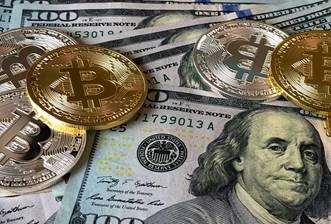Alpha Portfolio Service Brochure
FOMO – Fear Of Missing Out

The total value of Bitcoin is now worth over $1.3tn, making it 50% of the overall $2.6tn cryptocurrency market. With a simultaneous rally in the price of gold, that has also reached a new all-time high, what messages are these sending out about the health of global financial markets? Both are a potential cause for concern, sending mixed messages of investor extremes and signs of possible market excess.
Bitcoin has surged to an all-time high of over $70,000 ahead of the next expected halving event in April, when the number of new bitcoins will halve. These ‘events’ typically occur once every four years and reduce the reward given to ‘miners,’ in theory slowing down supply.
In contrast, the value of gold typically increases in times of uncertainty. This tends to reflect future global economic prospects or geopolitical tensions. More recently shifting expectations towards interest rate cuts by the US Federal Reserve, seems to have stimulated buying.
One of the main drivers of the rise in Bitcoin has been regulated investment firms. In January, US financial authorities allowed regulated investment firms to start selling new financial products linked to Bitcoin, called Spot Bitcoin ETFs. This has created buyers from hedge funds to market traders who can now bet on the price of Bitcoin without having to own the digital currency themselves. The scale of the speculating means that the investment firms are now Bitcoin whales with about 5% of the market. They are believed to have attracted over $7bn of potential investor interest!
As we highlighted recently in our 4th March Alpha Bites ‘Size Matters’, the US and European view of Bitcoin are poles apart. Two experts from the European Central Bank re-iterated that ‘the fair value of Bitcoin is zero and that the approval of a crypto-currency ETF does not change the fact that Bitcoin is not suitable as a means of payment or as an investment.’
It was certainly an interesting decision by the US Securities and Exchange Commission to approve the ETFs as they did acknowledge that crypto-currencies have been widely used to finance a range of terrorism and criminal activities. One of the most eye-opening holders of Bitcoin with approaching 2% is law enforcement agencies which arises from seizures from cyber-crime gangs!
The recent price movements in Bitcoin and gold don’t look sustainable. Could simple greed and FOMO (Fear of missing out) be factors contributing to the rise?
Central banks are continuing to buy gold, with China reported to be adding to its gold reserves for the sixteenth month-in-a row.
What have we been watching?
Thoughts have turned from a possible US economic ‘soft landing’ to ‘no landing’ and what this means for the Federal Reserve’s (Fed) stance on interest rates. Fed Chair Jerome Powell’s testimony to Congress last week was therefore key for global markets. His message was supportive of equities with the S&P 500 index extending its longest winning streak in six years. Jerome Powell said that interest rates will be cut this year if the US economy performs as the Fed expects. The Fed expects the US economy to keep growing at a solid pace. Elsewhere, China’s new economic growth forecast was met with a degree of scepticism, while in the UK, the Budget did not appear to deliver enough to claw the lost ground back for the Conservatives ahead of the election. Sterling hit a seven-month high against the Dollar at $1.285.
There was another ominous development in the Red Sea with three underwater data cables reported to have been cut. About 25% of data capacity between Asia and Africa is believed to have been affected. This would mark another step up in actions by Houthi rebels following the recent sinking of a British owned cargo ship. Meanwhile, three crew members of a Barbados-flagged cargo ship were killed by a Houthi missile strike – the first deaths caused by attacks on merchant vessels.
![]()
In the UK, an Ipsos survey has revealed a significant decline in support for the Conservative government, hitting a record low of 20% and 27% behind the Labour Party, making the largest gap recorded since 1978. The UK Spring Budget was very clearly a pre-Election performance by the Chancellor Jeremy Hunt with plenty of headline grabbing announcements from National Insurance to stealing Labour’s thunder over non-domiciles. From a market perspective, the OBR’s updated economic forecasts have raised UK economic growth to0.8% from 0.7% for 2024 and to 1.9% from 1.4% for 2025. The OBR also expects inflation to drop below the Bank of England’s 2% target in the second quarter of this year and to be 1.4% by the end of the fourth quarter. On this basis, the OBR expects the UK base rate to be 4.2% at the end of 2024 – so a 1% cut between now and then. Meanwhile, the Conservatives and Labour have been accused of a ‘conspiracy of silence’ over the scale of spending cuts or tax rises that might be required after the election by the Institute of Fiscal Studies.
![]()
The European Central Bank (ECB) left its deposit rate unchanged at 4% as expected. The ECB did however lower its core inflation forecast for 2024 very slightly to 2.6%. Eurozone economic growth for 2024 was trimmed from 0.8% to 0.6%. As is the case with other central banks, the ECB appears to need more evidence that inflation is sustainably coming down before it cuts interest rates. ECB President Christine Lagarde did acknowledge that wage growth is starting to moderate but said ‘we will know a little more in April, but a lot more in June.’ Markets are now pricing in up to four cuts in 2024 with the first now likely in June.
![]()
The US Supreme Court has struck down efforts by individual states to bar Donald Trump from running as a presidential candidate for November’s election. Last week also saw Super Tuesday with voters in 15 states select candidates for the election and these did not produce any surprise with a repeat of Biden against Trump looming. Biden’s approval rating amongst Americans continues to flat line at 36%. The US service sector saw activity slow in February with a reading of 52.6 which was slightly weaker than expected. Prices within the service sector continued to grow, albeit a slower pace, suggesting some easing of inflationary pressures. Fed Chair Jerome Powell said that the central bank was still looking for more evidence that inflation is on a downtrend and is essentially in data watching mode. He did offer support to markets by saying that US interest rates will be cut this year if the economy performs as the Fed expects.
![]()
The Japanese Yen climbed to a one-month high on speculation that the Bank of Japan may end its negative interest rate policy sooner than expected, following recent sticky inflation data.
![]()
Despite setting an ambitious 5% economic growth target at the National Peoples’s Congress, investors appeared to remain doubtful of the China’s leadership ability to successfully revive the economy. This was reflected in the latest business activity indicator for February with the Caixin Services index remaining in expansion but dipping slightly to 52.5. Meanwhile, China is planning to grow its defence spending, which is second only to the US, by over 7%. China has also officially adopted tougher language regarding Taiwan, dropping the mention of ‘peaceful reunification.’
![]()
Brent oil held steady at around $82.
Finally, the anticipated support for UK equities in the Spring Budget looked a bit of a damp squibb. The Chancellor has opted for a British ISA of an extra £5,000 a year over and above the current £20,000 but not until June as the proposal is subject to consultation. Some of the largest ISA providers are already calling the proposal a confusing ‘white elephant.’ In addition, UK pension funds will be required to disclose the share of their assets invested in the UK but only from 2027. Will Jeremy Hunt be around by then to implement this?

A reminder that voting closes on the 15th of March for the City of London Wealth Management Awards. If you have not yet cast your vote and wish to show your support we would greatly appreciate a moment of your time.
Please click here to vote.
A reminder that we have been nominated for the following categories:
- Best Discretionary Wealth Management
- Best Market Newsletter
- Regional Wealth Manager of the Year: Wales & West England
- Wealth Management Company of the Year
Thank you for your consideration.
Read Last Week’s Alpha Bites – Size Matters
Further information about Alpha Portfolio Management, our products and services, please visit www.alpha-pm.co.uk or email info@alpha-pm.co.uk. Alternatively, you can call us on 0117 203 3460.
This publication is for informational purposes only and should not be relied upon. The opinions expressed here represent analysis by an Alpha Portfolio Management representative at the time of preparation and should not be interpreted as investment advice.
You should seek professional advice before making any investment decisions. The past is not necessarily a guide to future performance. The value of shares and the income from them can fall as well as rise and investors may get back less than they originally invested. The sender does not accept legal responsibility for any errors or omissions, in the context of this message, which arise as a result of internet transmission or as a result of changes made to this document after it was sent.
Alpha Portfolio Management is a trading name of R C Brown Investment Management PLC which is authorised and regulated by the FCA.
Registered Office: 1 The Square, Temple Quay, Bristol, BS1 6DG. Registered in England No. 2489639
Copyright © 2021 Alpha Portfolio Management, All rights reserved
Full version
© Alpha Portfolio Management 2025. All Rights Reserved
Site by Lookhappy

